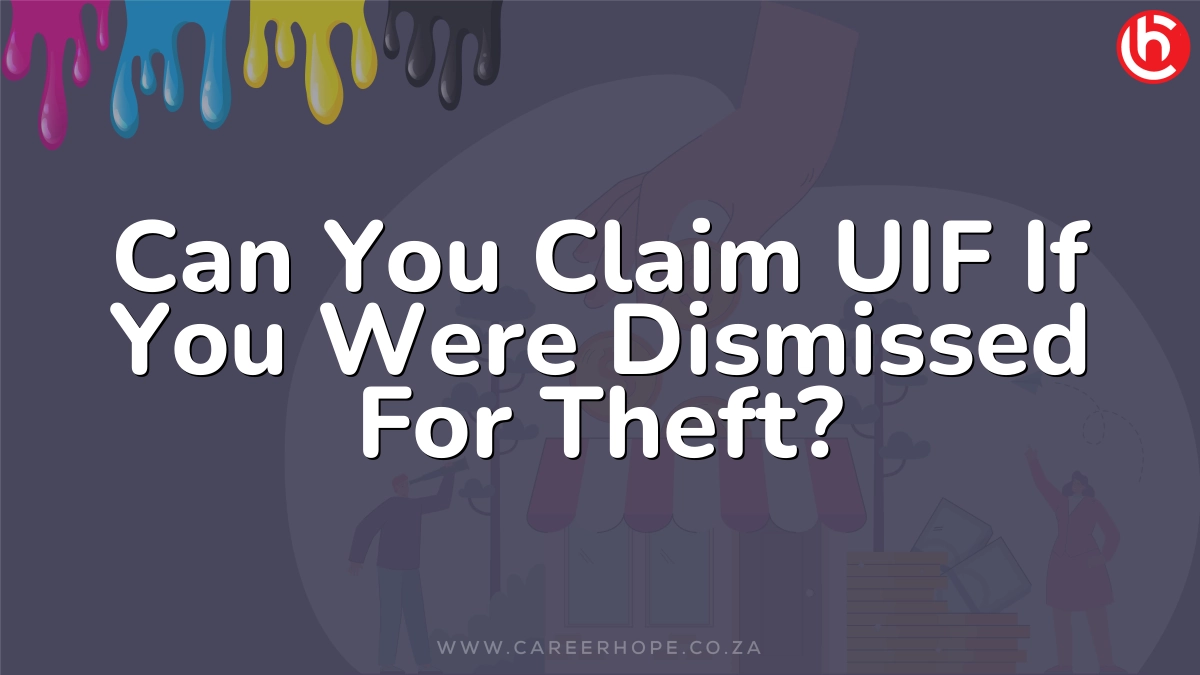According to South African labor laws, the Unemployment Insurance Act stipulates that employees who have been dismissed due to misconduct or theft are generally not eligible to claim UIF benefits. However, this ruling is not set in stone, and there are exceptions to this rule that warrant careful consideration.
Exceptions to the Rule
While dismissal for misconduct or theft typically disqualifies an individual from receiving UIF benefits, there are instances where claims may be considered valid. These exceptions include:
- If the dismissal was procedurally unfair or unjustified, as determined by the Commission for Conciliation, Mediation and Arbitration (CCMA) or the Labor Court.
- If the employee successfully appeals the dismissal and is subsequently reinstated.
- If the employer fails to comply with the necessary procedural requirements during the dismissal process, rendering the dismissal invalid.
The Application Process
Despite the potential challenges, dismissed employees are still encouraged to submit their UIF claim applications. The process typically involves:
- Obtaining the necessary documentation from the employer, including the UI-19 form, which outlines the reason for dismissal.
- Submitting the completed UI-19 form, along with supporting documents, to the nearest Labor Center within six months of the dismissal date.
- Providing any additional evidence or documentation requested by the UIF claims officer.
It is crucial to note that each case is evaluated on its individual merits, and the decision to grant or deny UIF benefits rests with the claims officer’s discretion.
People Also Ask
Can I claim UIF if I was dismissed for absenteeism?
Dismissal for absenteeism or desertion is generally considered a form of misconduct, and as such, you may not be eligible to claim UIF benefits. However, if your dismissal was procedurally unfair or unjustified, you may have grounds to appeal and potentially claim UIF.
What if my employer deducted UIF contributions but never paid them over?
In such cases, your employer has violated labor laws by failing to remit the deducted UIF contributions to the relevant authorities. You can report this issue to the Department of Labor, and legal action may be taken against your employer to recover the outstanding contributions.
Can I claim UIF if I resigned voluntarily?
Generally, no. Voluntary resignation is not considered a valid reason for claiming UIF benefits, as the termination of employment was by your own choice. However, there may be exceptions if you resigned due to constructive dismissal or under extenuating circumstances.
What happens to my UIF contributions if I don’t claim within the stipulated timeframe?
If you fail to claim your UIF benefits within six months of dismissal or termination, your contributions will unfortunately be forfeited and remain with the UIF fund. It is crucial to adhere to the six-month deadline to avoid losing your rightful benefits.
What happens to UIF contributions if not claimed within six months?
UIF contributions may be forfeited if not claimed within the stipulated time frame.
How long does UIF pay out for retrenchment?
UIF typically pays out benefits for up to six months following retrenchment.
What if my employer deducted UIF but did not remit it?
Contact the Department of Labour for assistance in such cases.
Can foreign nationals claim UIF benefits?
Foreign nationals may face challenges in claiming UIF benefits if they do not hold an SA green book.
Conclusion
While dismissal for misconduct or theft can undoubtedly complicate the process of claiming UIF benefits, it is not an outright disqualification. By understanding the legal nuances, following the proper procedures, and providing compelling evidence, dismissed employees may still have a chance to access their rightful unemployment benefits. Remember, knowledge is power, and being informed about your rights can make all the difference in navigating the intricate world of labor laws.
If you find yourself in such a predicament, it is advisable to seek professional legal counsel or guidance from labor authorities to ensure your best interests are represented and your rights are protected.

